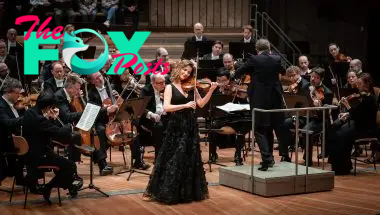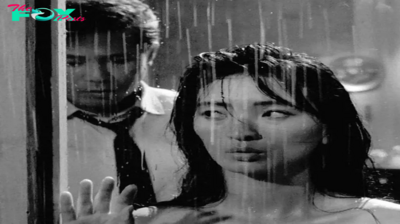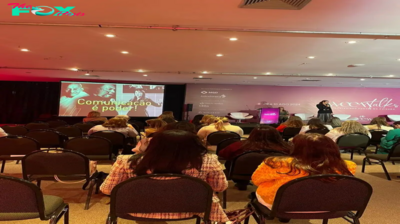Entertainment
A rewarding foretaste of the Berlin Philharmonic’s 2024 Could Day European Live performance – Seen and Heard Worldwide
 Germany Schubert, Brahms, and Beethoven: Lisa Batiashvili (violin), Berlin Philharmonic Orchestra / Daniel Harding (conductor). Philharmonie, Berlin, 26.4.2024 (MB)
Germany Schubert, Brahms, and Beethoven: Lisa Batiashvili (violin), Berlin Philharmonic Orchestra / Daniel Harding (conductor). Philharmonie, Berlin, 26.4.2024 (MB)

Schubert – Die Zauberharfe, D 644: Overture
Brahms – Violin Concerto in D main, Op.77
Beethoven – Symphony No.5 in C minor, Op.67
The Berlin Philharmonic’s European Live performance has since 1991 taken place yearly in a distinct European location ‘of cultural and historic significance’, additionally marking the anniversary of the orchestra’s basis on 1 Could 1882. This 12 months, the orchestra will journey with Lisa Batiashvili and Daniel Harding, to the amphitheatre at Tsinandali in Georgia, repeating the live performance the next day at Tbilisi Opera Home. This would be the orchestra’s first tour to Georgia, a candidate member for European Union membership, at which hopeful standing we British non-xenophobes can solely nod wistfully. Two performances had been additionally scheduled earlier than departure in Berlin, Harding changing Daniel Barenboim, for whom well being issues alas precluded him from conducting.
Schubert’s Zauberharfe Overture, as soon as thought to have been a part of his incidental music to Rosamunde, started promisingly, with grand, dramatic opening chords and broad lyricism from characterful wind and cultivated strings (with, until my ears deceived me, a little bit portamento). It was a distinct sound from that which Barenboim would have drawn from the orchestra, a little bit extra ‘interval’, even Harnoncourt-ish, however there isn’t any level in attending a live performance wishing it had been one thing else, and I doubt Barenboim would have taken this introduction any slower. For the Allegro vivace, Harding imparted a superb, virtually Mendelssohnian sense of launch. He drove laborious, nevertheless it made sense by itself, alternatively Romantic phrases, with trendy articulation, the shut clearly anticipating the ‘Nice’ C main Symphony. The place it fell down for me was within the admittedly troublesome transitions, which emerged considerably stop-start; there was little sense of listening to (and speaking) the piece as an entire.
The Brahms Violin Concerto instantly supplied a extra ‘conventional’ sound, the depth of the Berlin strings all one might ask for, with out forsaking prior virtues. Harding as soon as once more confirmed himself a superb ‘accompanist’, supportive but doing excess of merely following. He might actually whip up a storm when required, if sometimes edging into the realm of the rhetorical. Batiashvili’s entry confirmed every part one may need hoped for: dead-centred focus, springing from the orchestra, and asserting her as first amongst equals. Each observe of her half was not solely current and proper, however meaningfully so. Harding yielded greater than within the Schubert, making ready the best way for deepest melancholy within the solo efficiency. Certainly, the dialectics of Batiashvili’s richly conceived and rewarding studying, arguably Harding’s too, had been strongly Beethovenian. Busoni’s cadenza supplied an exquisite shock, starting with timpani rolls that turned it right into a quasi-duet, nonetheless extra so when strings entered. It was usually fascinating, neither certain by custom nor out of preserving, extra concise than Joachim’s; it made the return of Brahms’s full orchestra all of the extra poignant, bathed in afterglow. For the gradual motion, Berlin woodwind – Albrecht Mayer, EMMAnuel Pahud, Wenzel Fuchs – absolutely lived as much as expectations, fruity, post-Mozart Harmoniemusik additionally providing songful Innigkeit, a barely backward look seemingly taken ahead by Batiashvili and subsequent interaction.
Stability between construction and spontaneity was effectively judged all through; there was nothing rhapsodic right here, but in the very best, most safe sense it sounded free. Following a smattering of baffling, relatively unsettling applause – there had been none following the primary motion – initiative was regained in an incisive and joyous account of the finale, lilt and heft rising naturally as required. It sounded newly minted, having one marvel how Hans von Bülow or anybody else might ever have thought this a ‘concerto towards violin’. The inevitable Bach encore, the Andante from the A minor Sonata, BWV 1003, proved something however superfluous, as calming because it was rigorous.
Harding’s Beethoven had a lot to commend it, albeit with out scaling the heights of Barenboim’s. The Fifth Symphony is a very troublesome work to deliver off; in my concertgoing expertise, solely Barenboim has really captured its spirit in addition to letter, although Harding was actually not deprived by different comparisons. Certainly, the primary motion got here near exemplary, pressing with out mannerism, born of evident belief within the rating and talent to deliver it off the web page. Rhetoric grew out of motivic drive and cohesion, relatively than being imposed upon them. I by no means stop, save within the worst of performances, to be amazed by its concision; this was no exception. Cut up violins helped too, as that they had earlier and would later. The second motion made for a flowing, extremely contrasted processional, though simply sometimes, no less than for me, that fondness for rhetoric obtained the higher of it. In any other case, it unfolded with commendable inevitability and a eager ear for element.
Taking part in was all through magnificent, not least splendidly ‘current’ cellos and double basses, which continued into the Scherzo and Trio. Right here, particularly within the scherzo, and much more so within the transition to the finale, I missed a way of one thing deeper, or what the music may imply, with due regard to these whose aesthetics insist vainly that it doesn’t. The trio’s counterpoint pretty flew off the strings, and the scherzo’s reprise was ghostly sufficient. A musicianly account of the finale grew out of what had gone earlier than; it was effectively paced, balanced, and articulated. There was little doubt in my thoughts that Harding achieved what he wished to, but the elegant exultancy of sunshine vanquishing darkness for me by no means actually registered. Now greater than ever, this appears to be a message solely Barenboim – and his unimaginable but ever-more-necessary West-Japanese Divan – can supply.
Mark Berry
-

 Entertainment4h ago
Entertainment4h agoHighest-Paid Podcasters in the World: Joe Rogan, Bill Simmons and More
-

 Entertainment4h ago
Entertainment4h agoFrom Camila Cabello to Sabrina Carpenter, Look at Shawn Mendes’ Dating History
-

 Entertainment9h ago
Entertainment9h agoA Look at the Dating History and Rumoured Relationships of BIGBANG Star G-Dragon
-

 Entertainment17h ago
Entertainment17h agoMike and Lauren Sorrentino Introduce Baby No. 3 to Kids in ‘Jersey Shore’ Exclusive Clip
-

 Entertainment20h ago
Entertainment20h agoNatasha Rothwell on Her Memorable Firsts
-

 Entertainment1d ago
Entertainment1d agoFace Me and Other Korean Medical Crime Shows That are Must Watch
-

 Entertainment1d ago
Entertainment1d agoClassic Korean Movies Like Piagol to Add to Your Watch List
-

 Entertainment1d ago
Entertainment1d agoOver 60 Million People Tuned in to Watch Jake Paul vs. Mike Tyson



















